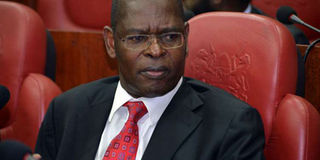Kinisu should leave to save war on corruption

The chairman of the Ethics and Anti-Corruption Commission, Philip Kinisu, before the joint select committee on the body at Parliament Buildings in Nairobi on July 25, 2016. PHOTO | SALATON NJAU | NATION MEDIA GROUP
What you need to know:
As it is now Mr Kinisu is unable to properly work for three reasons.
One, he has lost the high moral pedestal to condemn and combat graft.
Two, given the sheer breadth and depth of the corruption allegations levelled against him, it will surely become a full-time job for him to defend himself against them.
He must simply be too busy and distracted to be able to apply his mind fully to his job.
Third, his fellow commissioners have so eloquently pronounced themselves on the matter: that Mr Kinisu should take personal responsibility and pave the way.
How, pray, shall he work with colleagues who have told him to leave?
The chairmanship of the Ethics and Anti-Corruption Commission (EACC) is one of the most important and demanding public jobs in Kenya today. Preventing corruption is the core mandate of the office holder. This is because corruption in public office and institutions has reached unprecedented levels. This has exalted the relevance of this office to very high levels. A higher than our usual standard of integrity is, therefore, required of the office holder.
The current chairman is Mr Philip Kinisu. He has a very impressive level of formal education and has had a successful career as an auditor. During his vetting before Parliament, Mr Kinisu proclaimed himself a distinguished intellectual with immense experience and a self-avowed diligent man of impeccable integrity. In short, he told us he fits the bill. The whole world believed him.
However, in the most dramatic and ironic turn of events, the man charged with leading the anti-corruption crusade is in the eye of a storm. A perfect case of the hunter becoming the hunted. Esaki, a company he co-owns with his wife, has been in the news. It has emerged that the Kinisus’ company, alongside many others, benefited from the troubled National Youth Service (NYS) funds.
The seriousness of the NYS scandal cannot be overstated. It cost former powerful Cabinet Secretary Anne Waiguru her job, together with Principal Secretary Peter Mangiti.
THAT TIME
It is important to know that Mr Kinisu was a director of the company at the time of the transactions in question until he resigned in April. It is equally important to point out that nothing irregular has been established so far in relation to the award of the tenders to Esaki. Investigations into the dealings are underway and Mr Kinisu has already recorded a statement with the Directorate of Criminal Investigations. Mr Kinisu’s criminal culpability can only be established upon completion of the investigations. He must be accorded due process and protection of the law. He has also maintained his innocence and blamed “crooks” for his misfortunes. He says they are unhappy with his progress in his fight against graft.
The fundamental question we must now ask ourselves is: is Mr Kinisu’s continued stay at the helm of the EACC tenable?
It is my view that it certainly is no longer tenable. The Esaki dealings have robbed him of the credibility currency and drained him of the requisite legitimacy quotient needed to fight graft. Public support is essential in the fight against graft. Unfortunately, in the public eye, based on the available public material, Mr Kinisu no longer has a modicum of moral authority to lead the war on graft because he is conflicted.
The implications of these allegations are more devastating. What is deeply disturbing is that the EACC that Mr Kinisu chairs is actively carrying out investigations into the NYS scandal. It is possible that he has chaired several meetings where the NYS saga has been discussed and perhaps made several recommendations. Would he be objective and unbiased in such a scenario?
Even more egregious, Mr Kinisu’s other company is being investigated for money laundering. The full import of these two issues is that Mr Kinisu has lost the most important arsenal that was at his disposal in the fight against graft: personal integrity.
As it is now Mr Kinisu is unable to properly work for three reasons. One, he has lost the high moral pedestal to condemn and combat graft. Two, given the sheer breadth and depth of the corruption allegations levelled against him, it will surely become a full-time job for him to defend himself against them. He must simply be too busy and distracted to be able to apply his mind fully to his job. Third, his fellow commissioners have so eloquently pronounced themselves on the matter: that Mr Kinisu should take personal responsibility and pave the way. How, pray, shall he work with colleagues who have told him to leave? His continued stay at the helm of the EACC does not inspire public confidence in the war against graft. It is no longer tenable.
D.B.M. Mosota is an advocate of the High Court of Kenya and a partner at MMA Advocates




